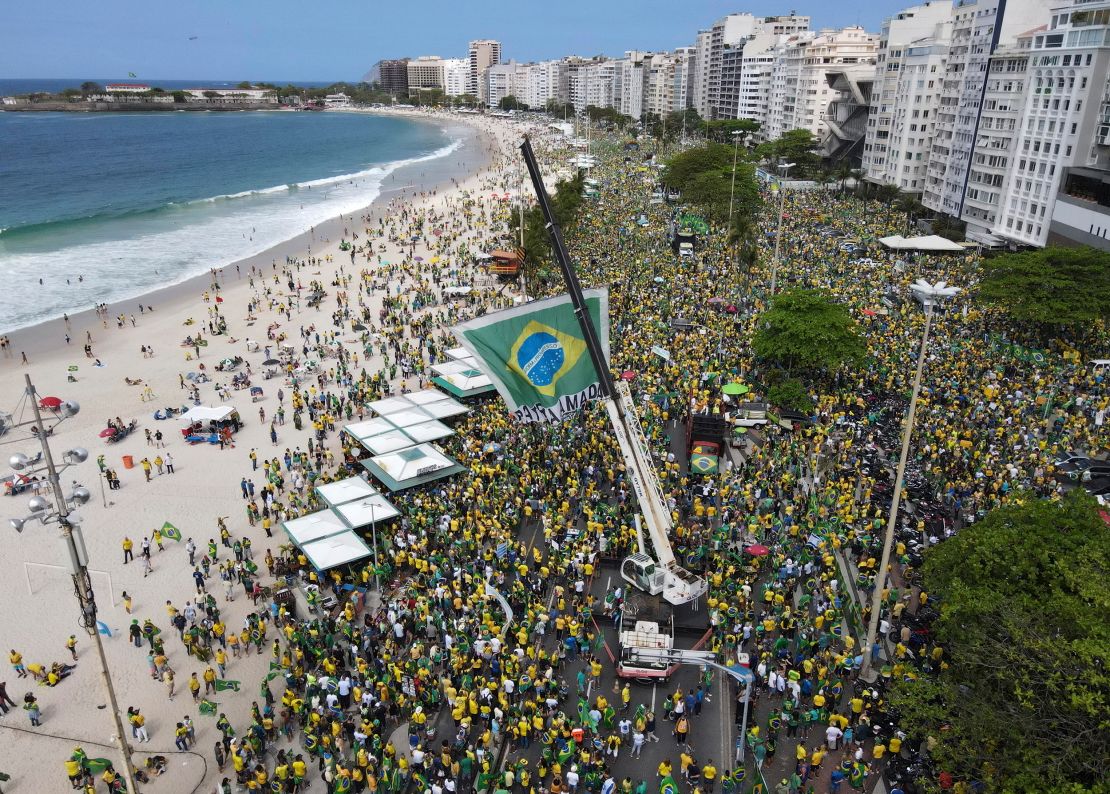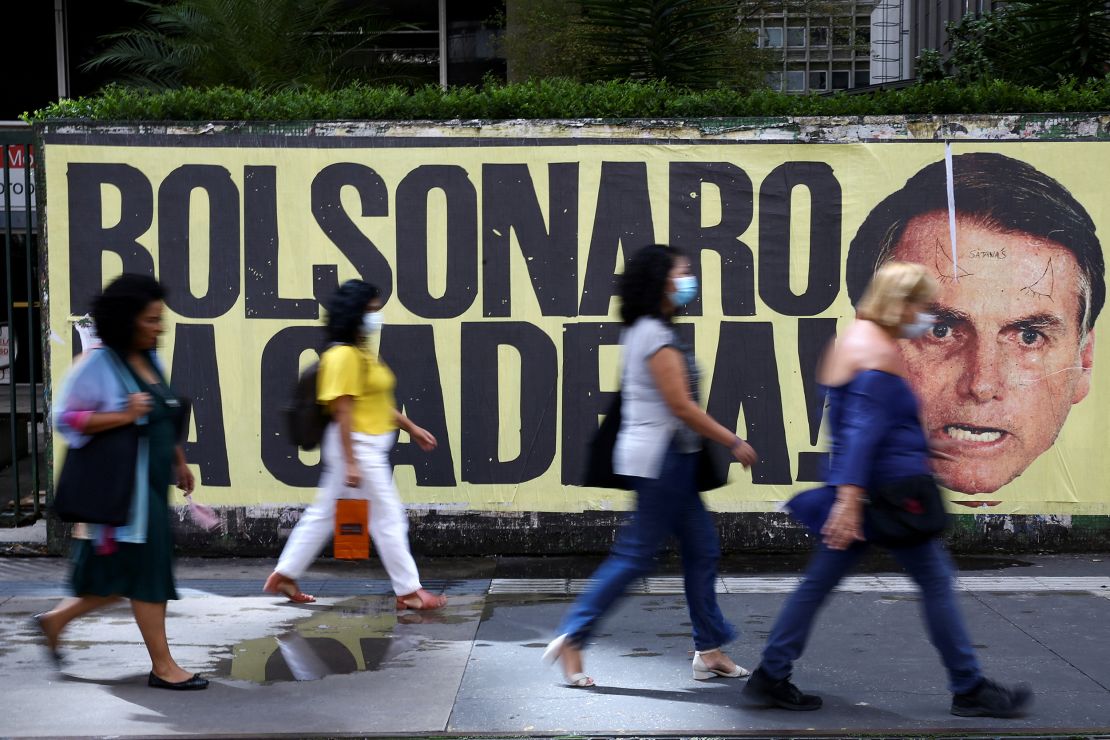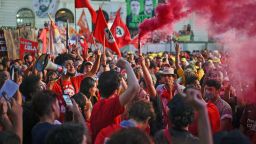Every year, September 7 in Brazil is a day of colorful parades, military demonstrations and national pride, as the country celebrates gaining its independence from colonial Portugal. But as Brazil heads toward presidential elections next month, President Jair Bolsonaro appears to be twisting the national holiday toward partisan ends.
Along with first lady Michelle Bolsonaro, the president attended a military parade in the capital Brasilia on Wednesday morning, greeting large crowds of supporters as the pair rode in a vintage Rolls-Royce convertible before the beginning of the event.
“The Brazilian people today are taking to the streets to celebrate 200 years of independence and eternity freedom. What is at stake is our freedom and our future. The population knows that it is the one that guides our decisions,” Bolsonaro said in an interview with a Brazilian state television channel ahead of the parade.
Though Independence Day is supposed to be a nonpartisan national holiday, the president has often referred to it as a key milestone in his re-election campaign, telling supporters to prepare to “give their lives” on that day – an escalation in rhetoric even for the outspoken populist leader.
“I call on all of you, on September 7, to take to the streets for the last time … All of you here have sworn to give your life for your freedom. Repeat with me: I swear to give my life for freedom,” Bolsonaro said, as he accepted the Liberal Party’s presidential nomination on July 23.

More recently, Bolsonaro told fans to show up to Independence Day celebrations in Rio, where he will be speaking, to “make a stand” and “fight for your freedom” – vague injunctions that critics warn could be interpreted as incitement to unruly behavior.
“(September 7) is the time to fight for your freedom.. let’s go make a stand,” the president told viewers during the live address on social media Thursday.
“If someone is accused of an undemocratic act, I want to pay myself for their (legal) defense,” he added, using the same term for attacks on Brazilian institutions and democratic norms of which he himself has often been accused.
Bolsonaro’s campaign team organized hundreds of political rallies to coincide with Independence Day and the president was expected to give a speech later on Wednesday at a political rally in Brasilia, and then join a military celebration and a rally in Rio de Janeiro in the afternoon.
Bolsonaro supporter Paulo Roseno, a former military sergeant who is helping to organize one such rally in Sao Paulo, told CNN he is expecting millions of people to be gathered on the city’s Paulista Avenue in support of Bolsonaro’s candidacy.
The president’s calls to action have been widely interpreted as echoing the election-denying rhetoric of former US President Donald Trump, whose convocation of supporters in Washington on Jan. 6, 2021, preceded a riot on Capitol Hill.
“Bolsonaro and Trump share the same authoritarian populist playbook,” says Guilherme Casar?es, professor of political science at Getulio Vargas University and coordinator of Brazil’s Far Right Observatory.
“Both indicated they would refuse to accept an electoral result negative to them, both talk about fraud in the ballots. They both also keep a permanent incitement of their radicalized base.”
He told CNN that that he foresees a “real risk” of a Jan. 6-type event in Brazil if Bolsonaro’s leftwing rival, Luiz Inacio Lula da Silva, eventually claims victory at the polls.
“I don’t think we’re going to have a coup in the classic sense with the military on the street, like what happened in 1964,” he said, referring to the historic overthrow that led to two decades of military dictatorship in Brazil.
“What I think is more likely to happen is an attempted coup, some kind of subversion of democracy … or any attempt to delay the electoral process by introducing doubts about the legitimacy of the process.”
CNN has reached out to Bolsonaro’s office for comment.
Election paranoia and fears of unrest
Waldir Ferraz, a close friend of Bolsonaro who is also organizing the president’s motorcade through Rio, downplays the possibility that the president’s statements could incite unrest or produce chaos.
The Independence Day festivities in Rio will simply demonstrate the breadth of Bolsonaro’s support, he told CNN, with “a sea of green and yellow.”
But he admits that this show of support is in part motivated by fans’ anger at an electoral system that they have been led to believe is tainted – despite the lack of evidence.
“There will be more than 1 million on the streets in Rio, because people now are angry with [Supreme Electoral Court chief] Alexandre de Moraes,” Ferraz says.
De Moraes, a longtime thorn in Bolsonaro’s side, this month greenlit search and seizure operations against several businessmen accused of participating in WhatsApp text conversations advocating a coup if Bolsonaro loses the presidential election, CNN Brasil reported.

As the race heats up between Bolsonaro and Lula, the incumbent president has frequently made statements undermining the legitimacy of the electoral process among his fans – in what critics fear could set the stage for unrest if Bolsonaro doesn’t win re-election.
The president has called for some voters to be filmed at the ballot box (an idea squashed by the Electoral Court) and claimed that the country’s electronic voting system has been compromised in the past and is at risk of fraud now, though there is no record of fraud in Brazilian electronic ballots since they began in 1996. He has also suggested that the Armed Forces should perform a parallel ballot count to verify the result.
The military has previously served as observers during elections, along with representatives of political parties and universities. But as Lula pulls ahead in the polls, discussion among supporters of an even more active role by the Brazilian Armed Forces – including calls for a military intervention if Bolsonaro loses – has intensified on social media.
“We will not trust the results [if Bolsonaro loses] and will demand the president to call the Armed Forces to intervene. But note that this is not a coup, it is a counter coup,” says Roseno.
Brazil’s military leadership
Against this backdrop, the potential for overlap between military events and pro-Bolsonaro campaign events on Independence Day could offer cause for concern. If the president turns his speech in Rio into a campaign opportunity, the military’s planned display of ships, parachutists and hourly rifle salutes could instantly take on ominous political significance.
“We should not have such overlap of a national event with a large military participation with a campaign event,” said Casar?es.
“The military that should be a state force that serves the interests of a government. [The Independence Day events] will allow Bolsonaro to use the military’s symbol … to lend credibility to his presidential candidacy,” he added.
Concerned about the possible politicization of Wednesday’s military maneuvers, the Federal Attorney’s office of Rio sent an official letter to the local Military, Naval and Air command publicized on Sept. 2 asking how it would ensure that official Independence Day celebrations would not be confused with partisan political demonstrations.
Asked if it had received a response, the Attorney’s office told CNN that the Armed Forces has until Wednesday morning to reply. The military did not respond to CNN’s request for comment.

Ever since Bolsonaro’s decree last year allowing active-duty military to hold public office , the border between his government and Brazil’s military leadership has been increasingly blurred.
The president, himself a former Army captain, has made no secret of his admiration of the Armed Forces. He frequently invokes the military on the campaign trail and has done little to avoid the appearance of politicizing the country’s military.
His vice presidential candidate is an active general, General Walter Braga Netto. In 2020, over 6000 members of his government were members of the military, according to a report published by the Federal Audit Court (TCU).
The sympathy appears to run both ways. The Armed Forces’ leadership has echoed Bolsonaro’s election fraud claims, raising its own doubts about voting security to the Electoral Court.
Defense Minister Paulo Sérgio Nogueira de Oliveira last July said the military leadership did not necessarily doubt the electoral system, but said he believed it needed improvement.
“We know very well that this electronic system always needs improvement. There is no program immune to an attack, immune to being invaded,” said Nogueira during a hearing at the Commission on Foreign Relations and National Defense.
“We are not doubting, or thinking this or that. It is simply a collaborative spirit,” added the minister.
Bolsonaro has said that he will accept the results of the upcoming Brazil presidential election “as long they are fair and clean,” in an interview with TV Globo′s Jornal Nacional this month.
His campaign and political allies have also dismissed fans’ calls for military intervention. To Ferraz, chatter online and among extremist Bolsonaro supporters of a military intervention in the upcoming election has no basis in reality. “This can’t happen,” he says.
Nevertheless, Roseno, the rally organizer, insists that he expects the worst. Falsely convinced that the deck is loaded against his candidate, he predicts that if the Armed Forces don’t intervene to ensure Bolsonaro’s re-election, “the people will” – conjuring exactly the vision of violent insurrection that experts warn the president risks inciting.
CNN’s Caitlin Hu in New York contributed to this report.

